The government's proposal to reduce taxes on petrol and diesel in 2025 and 2026 has just been out for consultation. Among the more critical voices is the KI, which dryly notes that there is a lack of analysis as to why reduced diesel and petrol prices are the best way to ease the burden on households and businesses affected by large price increases.
"Prices have risen broadly in society and there is a lack of motivation as to why diesel and petrol prices in particular should be kept down," writes KI in its consultation response.
More Targeted
On the contrary, KI believes that there are more targeted ways to reach the same consumers who are most affected by the increased cost of driving a car, using the same amount of money. In the government's budget for 2025, the tax reduction is one of the largest expenditures – 3.2 billion kronor, and in 2026 the cost increases to 5.5 billion.
KI also points out that Sweden must live up to the EU's goals, otherwise hefty fines may await. It is not possible to avoid taking action.
"With lower fuel prices, the need for other policy instruments and measures increases, which in turn can have different types of costs. The memorandum lacks analyses of how large these other costs may become," writes KI.
On one point, however, KI agrees with the government, and that is in the conclusion of the impact analysis that lower fuel prices lead to weakened incentives to buy electric cars or increase the use of fossil-free fuels.
Electric Car Purchases Slow Down
Several other consultation bodies also point out that fewer people will buy electric cars if the price of petrol and diesel is kept down. This slows down the transition to a more electrified vehicle fleet.
The Swedish Transport Administration, the Transport Analysis Agency, the Environmental Protection Agency, and the Swedish Society for Nature Conservation are among those who oppose the proposal. This is partly because it will be more difficult to achieve national and European climate goals, as well as goals to reduce air pollution.
Several consultation bodies welcome the fact that it will become cheaper to refuel. These include the Taxpayers' Association and the Confederation of Swedish Enterprise. They would have liked the government to go even further.
The government proposes to reduce taxes on petrol and diesel from January 1, 2025, and again on July 1, 2025, when the reduction obligation is increased. The same tax rates will also apply in 2026.
The government estimates that the reduction will cost approximately 3.2 billion kronor in 2025 and 5.5 billion in 2026.
Source: The Government






